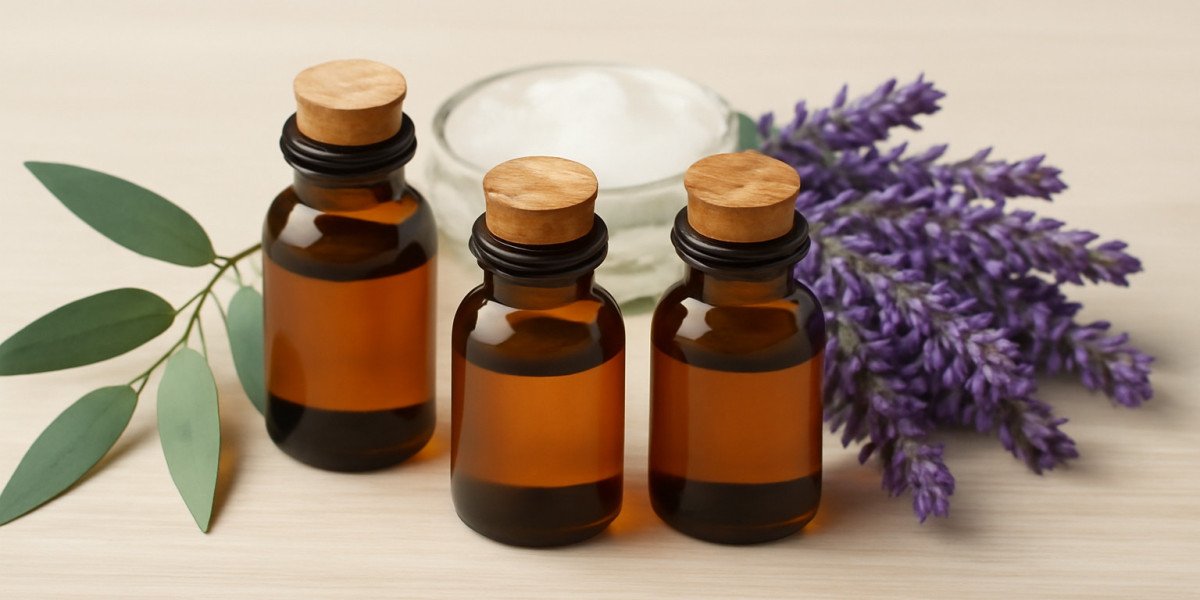Essential oils have gained significant popularity in recent years, thanks to their versatility and numerous benefits for physical, emotional, and mental well-being. Among the most widely used essential oils are Eucalyptus, Camphor, and Lavender. These oils have been cherished for centuries due to their healing properties and ability to promote wellness. In this ultimate guide, we will explore the benefits and uses of each of these oils, focusing on their advantages for health, relaxation, and everyday life.
1. What Are Essential Oils?
Before we dive into the specifics of Eucalyptus, Camphor, and Lavender oils, it’s important to understand what essential oils are. Essential oils are concentrated plant extracts obtained through various methods, such as steam distillation or cold pressing. They capture the natural essence of the plant, which includes its aroma and beneficial properties. Essential oils are potent, and their application can be both therapeutic and restorative.
Essential oils are commonly used in aromatherapy, a holistic practice that uses natural plant extracts to promote physical and emotional health. In addition to aromatherapy, they have been incorporated into skin care, natural cleaning products, and even household remedies.
2. Eucalyptus Oil Benefits
Eucalyptus oil is derived from the leaves of the Eucalyptus tree, a plant native to Australia. It has a fresh, invigorating aroma and a wide range of uses. Eucalyptus oil is known for its antibacterial, anti-inflammatory, and decongestant properties, making it a popular choice in health and wellness practices.
a. Respiratory Health
One of the most well-known benefits of eucalyptus oil is its ability to support respiratory health. The oil contains eucalyptol (also known as 1,8-cineole), which has shown effectiveness in easing symptoms of respiratory conditions such as colds, coughs, and bronchitis. When diffused or inhaled, it can help clear nasal passages, reduce congestion, and improve airflow, making it ideal for those struggling with seasonal allergies or respiratory infections.
How to use: Add a few drops of eucalyptus oil to a bowl of hot water and inhale the steam, or use a diffuser in your bedroom or living room. You can also mix a few drops with a carrier oil and massage it into your chest and back for additional relief.
b. Muscle and Joint Pain Relief
Eucalyptus oil is a natural analgesic that can help alleviate muscle and joint pain. Its anti-inflammatory properties make it an effective remedy for conditions like arthritis, sore muscles, and general aches and pains.
How to use: Blend eucalyptus oil with a carrier oil like coconut oil and massage it into sore muscles. Alternatively, you can add it to a warm bath for a relaxing soak.
c. Skin Care
Eucalyptus oil has antiseptic qualities that make it beneficial for treating skin infections, cuts, and minor burns. It also promotes healthy skin by reducing irritation and inflammation, making it a good choice for acne-prone skin.
How to use: Dilute eucalyptus oil in a carrier oil and apply it to affected areas, such as pimples, cuts, or bruises.
3. Camphor Oil Uses
Camphor oil is extracted from the wood of the Camphor tree, native to Southeast Asia. Camphor has a sharp, cooling scent and is well-known for its medicinal properties. It is used in a variety of forms, including topical ointments, salves, and essential oils.
a. Pain Relief and Muscle Relaxation
Camphor oil is a well-known remedy for relieving muscle pain and tension. It has a cooling effect when applied topically, helping to reduce inflammation and promote blood circulation. It is commonly found in over-the-counter muscle rubs and balms.
How to use: Apply diluted camphor oil directly to sore muscles, joints, or areas with tension. You can also use it in a warm compress for added relief.
b. Respiratory Support
Like eucalyptus oil, camphor oil is effective in clearing blocked sinuses and promoting easier breathing. It can be used as an inhalant to relieve congestion, especially when combined with other decongestant oils like peppermint or eucalyptus.
How to use: Add a few drops of camphor oil to a bowl of hot water and inhale the steam. You can also diffuse it in your living space or use it in steam therapy for cough relief.
c. Skin Care
Camphor oil is beneficial for treating skin irritation and infections. It has natural antifungal and antibacterial properties, which makes it effective in treating skin conditions like eczema, rashes, and acne. It also promotes blood flow, which can help with healing.
How to use: Mix camphor oil with a carrier oil and apply it to areas affected by skin issues. Be sure to test it on a small area first, as it can cause irritation in sensitive individuals.
4. Lavender Oil for Relaxation
Lavender oil is one of the most popular and versatile essential oils in the world. Extracted from the lavender flower, this oil is well-known for its soothing and calming effects. Lavender oil has been used for centuries for its therapeutic properties and is highly prized for its ability to promote relaxation and emotional well-being.
a. Stress and Anxiety Relief
Lavender oil is widely recognized for its ability to reduce stress and promote relaxation. Research has shown that lavender oil can help lower levels of cortisol, the hormone associated with stress, and encourage a feeling of calmness. It’s often used in aromatherapy to alleviate anxiety, improve mood, and reduce nervous tension.
How to use: Use a diffuser to fill your room with the calming scent of lavender, or add a few drops to your pillow before sleep to promote restful sleep. You can also dilute lavender oil in a carrier oil and apply it to pulse points, like your wrists and temples.
b. Sleep Aid
Lavender oil is a natural sleep aid, helping to improve the quality of your sleep. It promotes relaxation and reduces anxiety, making it easier to fall and stay asleep. It’s one of the most commonly used essential oils for insomnia.
How to use: Add a few drops of lavender oil to your pillow or blanket, or use a diffuser in your bedroom. A relaxing lavender bath before bed can also help prepare your body for a restful sleep.
c. Pain and Inflammation Relief
Lavender oil also has analgesic properties, meaning it can help relieve pain and reduce inflammation. It is often used to soothe headaches, migraines, muscle pain, and even menstrual cramps.
How to use: Apply diluted lavender oil to the area of pain, such as your temples for headaches or your lower abdomen for cramps. You can also use it in a warm bath or massage it into sore muscles.
5. Essential Oils for Health: A Holistic Approach
Eucalyptus, camphor, and lavender oils are just a few examples of how essential oils can be used to support overall health. When used properly, these oils can help maintain physical health, improve mental clarity, reduce stress, and enhance emotional well-being.
a. How to Use Essential Oils Safely
While essential oils offer numerous benefits, it’s important to use them correctly. Always dilute essential oils with a carrier oil before applying them to the skin to avoid irritation. Conduct a patch test to ensure that you do not have an allergic reaction. Avoid applying essential oils near sensitive areas like the eyes, nose, or mouth.
b. Aromatherapy for Emotional Well-Being
Aromatherapy is an effective way to incorporate essential oils into your daily life. Whether you're looking for relaxation, increased focus, or better sleep, essential oils like eucalyptus, camphor, and lavender can support your emotional and physical well-being.
Conclusion
Essential oils are a natural and effective way to enhance your health and wellness routine. Eucalyptus oil offers respiratory support and pain relief, Camphor oil provides muscle relaxation and skin care benefits, and Lavender oil promotes relaxation and better sleep. By incorporating these oils into your daily life, you can take a holistic approach to wellness and enjoy their many therapeutic benefits.








